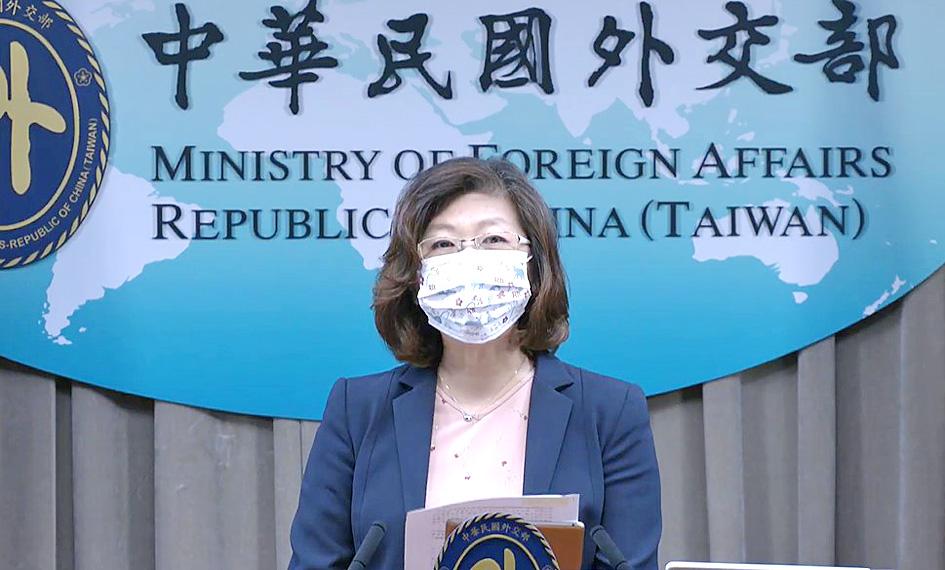Taiwan has gained 63 more foreign correspondents and 29 additional news organizations since 2020, a Ministry of Foreign Affairs official said yesterday, as media companies continue to relocate staff from Hong Kong and China.
The regional operations of 75 international media companies are based in Taiwan, drawing 137 journalists from 20 countries, Department of International Organizations Director Catherine Hsu (徐詠梅) told a routine news briefing in Taipei.
“The ministry sincerely welcomes international media companies to Taiwan and hopes companies will continue to relocate here in the future,” she said, adding that the ministry would continue to provide any necessary assistance.

Photo: Lu Yi-hsuan, Taipei Times
Over the past few years, Beijing has cracked down on the international media companies in China.
After the Chinese government imposed the National Security Law on Hong Kong, freedom of speech and judicial independence in the territory were greatly curbed.
This has resulted in some foreign media outlets relocating to Taiwan.
Many companies have chosen to leave Hong Kong due to China’s suppression of the media and free speech in the territory since the introduction of the National Security Law, Hsu said.
International media companies relocating to Taiwan are from a wider assortment of countries, she said, citing the arrival of companies from Oceania, South America and different regions of Asia.
The companies operate newspapers, television and radio programs, magazines and online news programs from their operations in Taiwan, she said.
“Their content is also diverse, covering everything from cross-strait affairs, Taiwan’s handling of the COVID-19 pandemic, industrial developments and the arts,” she said.
“Taiwan is a good place for them due to its protection of press freedoms, and its convenient geographical location, which makes regional travel easy,” Hsu added.
Reporters Without Borders ranked Taiwan 38th in its 2022 World Press Freedom Index released earlier this month, she said.
US-based Freedom House also listed Taiwan as a “free” country, and has ranked the nation 94th overall for two consecutive years, placing it second among all Asian countries, she added.

TRUST: The KMT said it respected the US’ timing and considerations, and hoped it would continue to honor its commitments to helping Taiwan bolster its defenses and deterrence US President Donald Trump is delaying a multibillion-dollar arms sale to Taiwan to ensure his visit to Beijing is successful, a New York Times report said. The weapons sales package has stalled in the US Department of State, the report said, citing US officials it did not identify. The White House has told agencies not to push forward ahead of Trump’s meeting with Chinese President Xi Jinping (習近平), it said. The two last month held a phone call to discuss trade and geopolitical flashpoints ahead of the summit. Xi raised the Taiwan issue and urged the US to handle arms sales to

A magnitude 5.6 earthquake struck off the coast of Yilan County at 12:37pm today, with clear shaking felt across much of northern Taiwan. There were no immediate reports of damage. The epicenter of the quake was 16.9km east-southeast of Yilan County Hall offshore at a depth of 66.8km, Central Weather Administration (CWA) data showed. The maximum intensity registered at a 4 in Yilan County’s Nanao Township (南澳) on Taiwan’s seven-tier scale. Other parts of Yilan, as well as certain areas of Hualien County, Taipei, New Taipei City, Taoyuan, Hsinchu County, Taichung and Miaoli County, recorded intensities of 3. Residents of Yilan County and Taipei received

Taiwan has secured another breakthrough in fruit exports, with jujubes, dragon fruit and lychees approved for shipment to the EU, the Ministry of Agriculture said yesterday. The Animal and Plant Health Inspection Agency on Thursday received formal notification of the approval from the EU, the ministry said, adding that the decision was expected to expand Taiwanese fruit producers’ access to high-end European markets. Taiwan exported 126 tonnes of lychees last year, valued at US$1.48 million, with Japan accounting for 102 tonnes. Other export destinations included New Zealand, Hong Kong, the US and Australia, ministry data showed. Jujube exports totaled 103 tonnes, valued at

BIG SPENDERS: Foreign investors bought the most Taiwan equities since 2005, signaling confidence that an AI boom would continue to benefit chipmakers Taiwan Semiconductor Manufacturing Co’s (TSMC, 台積電) market capitalization swelled to US$2 trillion for the first time following a 4.25 percent rally in its American depositary receipts (ADR) overnight, putting the world’s biggest contract chipmaker sixth on the list of the world’s biggest companies by market capitalization, just behind Amazon.com Inc. The site CompaniesMarketcap.com ranked TSMC ahead of Saudi Aramco and Meta Platforms Inc. The Taiwanese company’s ADRs on Tuesday surged to US$385.75 on the New York Stock Exchange, as strong demand for artificial intelligence (AI) applications led to chip supply constraints and boost revenue growth to record-breaking levels. Each TSMC ADR represents